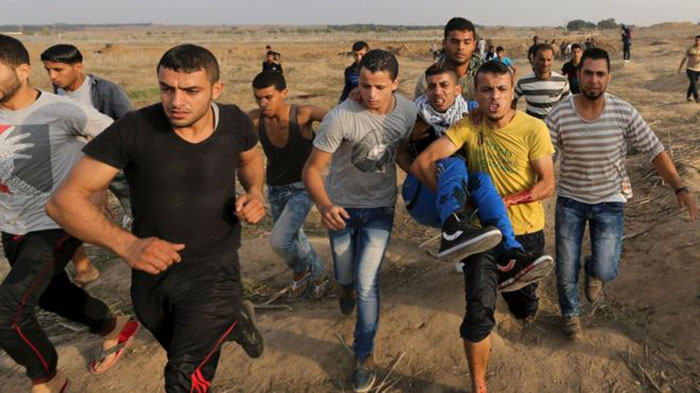Mr Ban spoke soon after police said a Palestinian drove his car into a group of Israelis in the occupied West Bank, injuring a soldier and a civilian.
Eight Israelis and more than 40 Palestinians, including attackers, have been killed in recent weeks.
The upsurge in violence began last month when tensions at a flashpoint holy site in Jerusalem revered by Jews and Muslims boiled over amid rumours that Israel planned to relax long-standing rules to strengthen Jewish rights at the complex. Israel has denied such claims.
Mr Ban appealed for calm at the start of a surprise visit to Jerusalem.
"My visit reflects the sense of global alarm at the dangerous escalation in violence between Israelis and Palestinians," he said, after meeting Israeli President Reuven Rivlin. "If we do not act fast, the dynamics on the ground will only get worse."
Prior to his visit, Mr Ban had urged both Israelis and Palestinians to end their "posturing and brinkmanship".
Addressing Palestinian youth, he said he understood their frustration and anger "at the continued [Israeli] occupation and expansion of settlements". But he added: "You must put down the weapons of despair."
Mr Ban told Israelis that he understood their "genuine concern about peace and security", but warned that "walls, checkpoints, harsh responses by the security forces and house demolitions cannot sustain the peace and safety that you need and must have".
On Tuesday morning, an Israeli soldier was stabbed and wounded during clashes with Palestinians near Beit Awwa, a village west of Hebron, the Israeli military said. The Palestinian attacker was shot and killed.
Hours later, an Israeli soldier and a civilian were injured in a vehicle attack at Gush Etzion junction in the southern West Bank, the Israeli military said.
The assailant reportedly drove his car into a group of pedestrians standing at a bus stop, and then got out and attempted to stab them before he was shot dead.
A Palestinian man was also killed during clashes with Israeli troops near the Gaza border fence, medics said.
Late on Tuesday, Israel`s military said two men were shot dead after a stabbing attack in Hebron that wounded a soldier.
Palestinian medics in the Gaza Strip meanwhile said a Palestinian man was shot dead and three others wounded during clashes between protesters and Israeli troops east of the Bureij refugee camp.
The Israeli military said "terrorists in Gaza" had attempted to attack soldiers near the border fence. They were "identified and targeted", and hits were confirmed, a statement added.
In another incident in the West Bank, an Israeli man died after being run over at the al-Fawar junction, south of Hebron, Israeli medics said.
An Associated Press photographer who witnessed the incident said the man left his car after Palestinian protesters threw stones at it, began to hit passing Palestinian cars with a stick or bat, and was struck by a lorry.
The Palestinian lorry driver handed himself in to Palestinian police, saying he collided with the man accidentally, Palestinian news agency Maan reported.
Overnight, Israeli troops destroyed and sealed the home of a Palestinian man who ran down, stabbed and killed an Israeli woman in the West Bank last year.
The Israeli military said the demolition was a "clear and deterring message that the involvement in terrorism has a price".
Such demolitions have been denounced by human rights groups as a form of collective punishment and against international law.
There has been a spate of stabbings of Israelis and some shootings - several of them fatal - by Palestinians since early October, and one apparent revenge stabbing by an Israeli. The attackers have struck in Jerusalem and across Israel, and in the occupied West Bank. Israel has tightened security and its security forces have clashed with rioting Palestinians, leading to deaths on the Palestinian side. The violence has also spread to the border with Gaza.
After a period of relative quiet, violence between the two communities has spiralled since clashes erupted at a flashpoint Jerusalem holy site in mid-September.
It was fuelled by rumours among Palestinians that Israel was attempting to alter a long-standing religious arrangement governing the site. Israel repeatedly dismissed the rumours as incitement. Soon afterwards, two Israelis were shot dead by Palestinians in the West Bank and the stabbing attacks began. Both Israel and the Palestinian authorities have accused one another of doing nothing to protect each other`s communities.
Is this a new Palestinian intifada, or uprising?
There have been two organised uprisings by Palestinians against Israeli occupation, in the 1980s and early 2000s. With peace talks moribund, some observers have questioned whether we are now seeing a third. The stabbing attacks seem to be opportunistic and although they have been praised by militant groups, Palestinian leader Mahmoud Abbas has said Palestinians are not interested in a further escalation.
More about:
















































